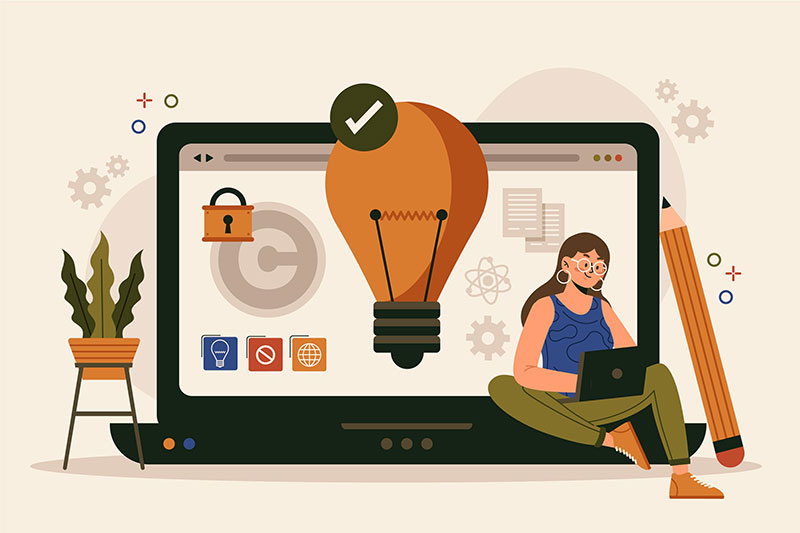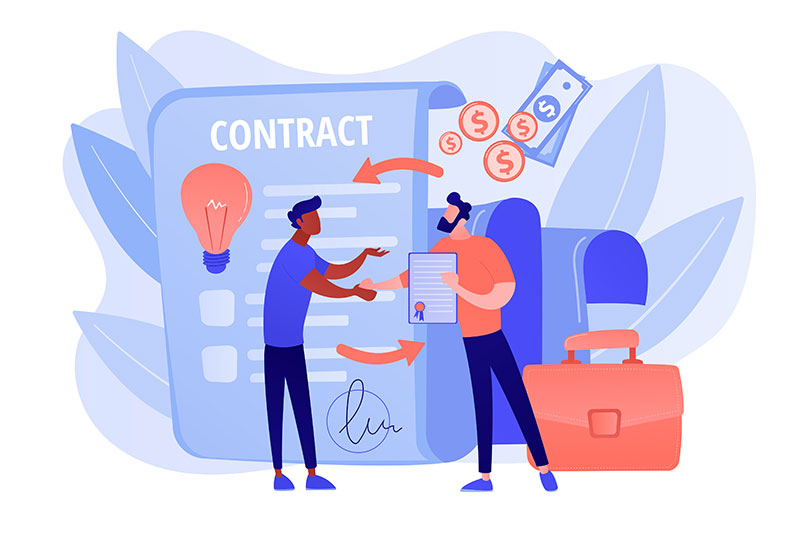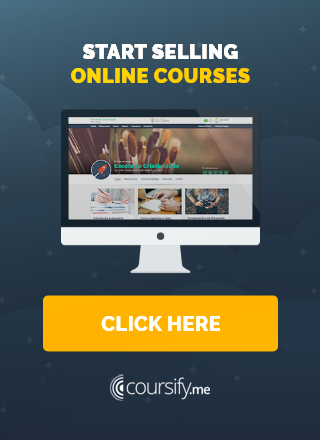Copyright: How to protect intellectual property in an online course
Intellectual property (IP) is a vital aspect of any business, and there are many factors that are important to understand if you make money by selling educational courses online.
In this article, let’s see more about Copyright and IP and how you can protect your course content.

Intellectual Property: How courses creators can protect their businesses
There are several different types of intellectual property protection that may be relevant to an online course – for example, if you have a logo or a company name, you may wish to register these as trademarks and prevent others from trying to imitate your success.
However, the most notable type of IP protection that you need to understand as a producer of online courses is copyright.
Copyright applies to original and tangible forms of creative expression – in other words, creative or artistic works.
The types of assets that qualify for copyright protection include pieces of writing, videos, audio recordings and more – almost all of which may be used as part of an online course.
Because of the accessibility provided by the internet, and the difficulty of enforcing copyright laws due to the speed with which malicious actors can work, it is important to understand your rights as a creator and the risks of infringement.
Below, the intellectual property experts at JMW Solicitors explain how copyright works in more detail, how to avoid infringing on the rights of others when putting together an online course, and what you should do if you are concerned that your own rights have been infringed upon.
– How to create online courses
How does copyright protection work?
Copyright protection prevents unauthorized reproduction, distribution, adaptation, and publication of a piece of work, by granting the exclusive rights to these uses of the work to the copyright holder.
A creator or owner of a work can then grant these rights to others through licensing or by selling the copyright.
Assets that can qualify for copyright protection include:
- Literary Works: This includes books, articles, poems, novels, and even computer software code. It covers any written content that is put down in a fixed format, whether fiction or nonfiction. As such, an online course presented in writing would be protected under this category.
- Films and Sound Recordings: This includes films, documentaries, music videos, and audio recordings. Online video courses are protected by copyright under this category.
- Dramatic Works: These include plays, screenplays, and scripts for film, television, and radio. If you have written scripts for a video course, they are protected by copyright, and this means that not only the videos, but the material within them, is protected.
- Broadcasts: This covers radio and television broadcasts, as well as cable transmissions. Live lectures or classes hosted online might be protected under the category.
- Artistic Works: This includes paintings, sculptures, drawings, photographs, architectural plans and designs, engravings, maps, and more. If your course contains original illustrations or instructional diagrams, these are eligible for copyright.
- Musical Works: This covers compositions of music, song lyrics, and any accompanying music. If you have created an original soundtrack for a video course, this would be protected. On the other hand, it is important to remember that if you want to use music or visual artworks that were created by someone else, you need to be careful not to infringe on their copyright in doing so. Using copyrighted music without paying for it, for example, could have legal consequences for a video producer.
- Typographical Arrangements: This includes the layout of published editions of written, dramatic and musical works. This could include any worksheets or course materials you have produced that have a unique layout.
– How to create videos for online courses
Copyright applies automatically upon the creation of an eligible work, meaning that you do not need to register to enjoy these rights.
It is also near-universal – 184 countries are parties to the Berne Convention, which means that they must offer the same copyright protections to works that they would enjoy in their countries of origin.
However, enforcement differs significantly from country to country, and it can be difficult to uphold your intellectual property rights over the internet, so this is something to bear in mind.
The copyright is usually owned by the person who created the work, but this is not always the case.
Provisions against unauthorized publication or distribution mean that you may not have the right to share or distribute your content if you are not the legal owner of the copyright, even if you created it yourself.
This may be relevant if you intend to share the same content on multiple platforms, as this may be prohibited by either your contract or the intellectual property laws that apply.
It is not always clear who owns the copyright to a particular asset or piece of content. However, in general, if you have produced the course assets yourself of your own volition, you will be considered the copyright owner under most circumstances.
This is also the case if you commissioned and paid someone else to produce assets for you – for example, if you hire someone to film video assets or produce artwork, the contract you offer them should specify how copyright ownership will be assigned.
– Learn how to record videos at home
On the other hand, if you have been employed to produce these assets on behalf of someone else, they may be considered the copyright owner.
If you have received a contract for this work, it should clarify the rights you have to your content, although this can become complicated due to a variety of factors.
In some cases, the terms and conditions that apply when publishing content on an online platform specify that the platform gains these rights, or mandate that you waive your ownership of the copyright in order to do so.
You can learn more about your rights in relation to your content by speaking to a solicitor.
– ELearning platform: what is it?
How can I avoid infringing on the copyright of others?
Another important thing to ensure when producing online courses – whether in video or another medium – is that you do not infringe on the copyright of others.
Any assets of the types listed above are subject to copyright protection automatically, and the rules that protect your work from unauthorized use also protect these assets.
This means that if you want to use music or images in your course, you must ensure that you have the right to do so.
You may be able to license copyrighted material by paying a license fee. Alternatively, there are many online outlets that provide assets under a Creative Commons license, which means that they are free to use provided you meet the requirements – in many cases, this simply means attributing the work appropriately.
In some jurisdictions, you are able to use small amounts of copyrighted material without paying, for the purposes of criticism or education.
In the UK, this is called “fair dealing”, while in the US it is called “fair use”, and it has other names elsewhere.
It may be worthwhile if your course relies on copyrighted material to consult with a solicitor and ensure you are not infringing on anyone else’s rights.
Otherwise, the penalties for infringement can range from an injunction – which could prevent you from using or making money from your work – to financial damages awarded to the other party.
– 10 profitable niches for online courses
What should I do if my intellectual property rights have been infringed?

If you are concerned that your rights have been infringed, the best step is to contact an expert intellectual property solicitor.
In some cases, infringement will be very clear-cut, while in others it can be much more ambiguous, and it is vital that you obtain legal advice before proceeding with any course of action.
There are several steps that you can take to address intellectual property infringement – for example, you may be able to bring an end to the infringement by sending a cease and desist letter, or you may need to take legal action to obtain an injunction that will prevent the sale, distribution or publication of the infringing materials.
Which option is the most viable will depend on the individual circumstances.
Additionally, many online platforms have a reporting function through which you can identify material that infringes on your copyright and have it removed.
It is against the terms of service of almost all content platforms to publish material that infringes on copyright, so this can be a way to quickly prevent further damage or financial losses.
However, as we have said, it is vital to consult a solicitor before taking this step; any actions you take can affect your chances of success should you pursue legal action to resolve a copyright infringement case, and the support of a lawyer can be vital in improving your odds.
By understanding how copyright applies, the terms and conditions of any platform you use to publish content, the provisions of any contract that applies and the steps you can take to combat infringement, you can uphold your rights and have the best chance to flourish as an online educator and course provider.
Coursify.me is a dynamic and customizable eLearning platform, which offers all the features you might need.
Present in more than 60 countries, is the perfect solution for those who want to create and sell online courses.
– Learn how to sell online courses
At Coursify.me you retain all copyrights to your content and we take seriously any plagiarism claims our hosted courses may suffer.
To know more, visit our website, test the platform and see why we are the best option for you your online course.

